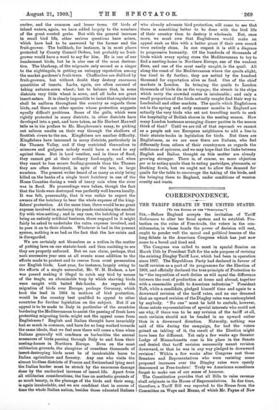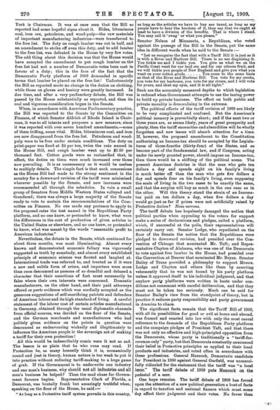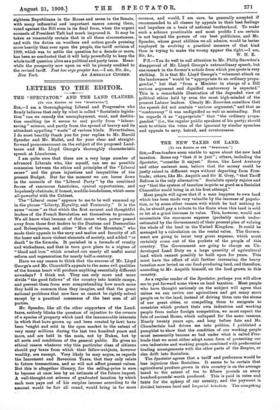CORRESPONDENCE.
THE TARIFF DEBATE IN THE UNITED STATES.
• Pro THR EDITOR OF THR " SPECTATOR:1 SIR,—Before England accepts the invitation of Tariff Reformers to alter her fiscal system and to establish Pro- tection on the ruins of Free-trade, the voters in the con- stituencies, in whose hands the power of decision will rest, ought to ponder well the moral and political lessons of the long debate in the American Congress which has just now come to a bored and tired end.
The Congress was called to meet in special Session on March 15th by President Taft for the sole purpose of revising the existing Dingley Tariff Law, which had been in operation since 1897. The Republican Party had declared in favour of tariff revision as a part of its programme for the Election of 1908, and officially declared the true principle of Protection to be "the imposition of such duties as will equal the difference between the cost of production at home and abroad, together with a reasonable profit to American industries." President Taft, while a candidate, pledged himself time and again to a downward revision of the tariff rates, and no one dreamed that an upward revision of the Dingley rates was contemplated by anybody. "No one" must be held to exclude, however, those astute representatives of special interests who could not see why, if there was to be any revision of the tariff at all, such revision should not be headed in an upward rather than in a downward direction. Naturally, nothing was said of this during the campaign, for had the voters gained an inkling of it, the result of the Election might have been far different. Yet only a few weeks ago Senator Lodge of Massachusetts rose in his place in the Senate and denied that tariff revision necessarily meant revision downward, or that he was in any way pledged to downward revision! Within a few weeks after Congress met those Senators and Representatives who were resisting some proposed increases over the Dingley rates were openly denounced as Free-traders! Truly we Americans sometimes forget to make use of our sense of humour.
The Constitution provides that all Bills to raise revenue shall originate in the House of Representatives. In due time, therefore, a Tariff Bill was reported to the House from the Committee on Ways and Means, of which Mr. Payne of- New York is Chairman. It was at once seen that the Bill so reported had some hopeful signs about it. Hides, bituminous coal, iron ore, petroleum, and wood-pulp—the raw materials of important manufacturing industries—were transferred to the free list. The duty on rough lumber was cut in half, and an amendment to strike off even this duty, and to add lumber to the free list, was defeated in the House by very few votes. The odd thing about this decision was that the House would have accepted the amendment to put rough lumber on the free list had not a number of Democratic votes been cast in favour of a duty; this in the face of the fact that the Democratic Party platform of 1908 demanded in specific terms that lumber be placed on the free list! Unfortunately the Bill as reported made no change in the duties on clothing, while those on gloves and hosiery were greatly increased. In due time, and after a very perfunctory debate, the Bill was passed by the House substantially as reported, and then its real and vigorous consideration began in the Senate.
When, in accordance with American Parliamentary practice, the Bill was reported to the Senate by the Committee on Finance, of which Senator Aldrich of Rhode Island is Chair- man, it was to all intents and purposes a new measure, since it was reported with over seven hundred amendments,—some of them trifling, some vital. Hides, bituminous coal, and iron ore now disappeared from the free list. Petroleum and wood. pulp were to be free under certain conditions. The duty on
print-paper was fixed at $4 per ton, twice the rate named in the House Bill, and rough lumber went up to $1-50 per thousand feet. Cotton goods were so reclassified that, in effect, the duties on them were much increased over those now prevailing. It is as unnecessary as it would be useless to multiply details. The simple fact is that such concessions as the House Bill had made to the strong sentiment in the country for a downward revision of the tariff were minimised wherever possible by the Senate, and new increases were recommended all through the schedules. In vain a small group of Senators from Middle Western States volleyed and thundered; there was always a large majority of the Senate ready to vote to sustain the recommendations of the Com- mittee on Finance. No one made any pretence to apply to the proposed rates the test named in the Republican Party platform, and no one knew, or pretended to know, what were the differences in the cost of production of given articles in the United States or elsewhere, and no one knew, or pretended to know, what was meant by the words "reasonable profit to American industries."
Nevertheless, the debate in the Senate, which continued for about three months, was most illuminating. Almost every known and demonstrated economic fallacy was vigorously supported as truth by somebody, and almost every established principle of economic science was flouted and laughed at. International trade was referred to, and treated as if it were a new and subtle form of crime, and importers were more than once denounced as persons of so dreadful and debased a character that their assertions of fact must necessarily be false where their own interests were concerned. Domestic manufacturers, on the other hand, and their paid attorneys offered ex parts evidence which was cordially accepted as the generous suggestions of self-sacrificing patriots and defenders of American labour and its high standard of living. A careful statement of the labour cost of certain articles manufactured in Germany, obtained through the usual diplomatic channels from official sources, was derided on the floor of the Senate, and the German merchants and manufacturers who had politely given evidence on the points in question were denounced as endeavouring wickedly and illegitimately to influence the American people ir the sovereign act of making a tariff for their own protection!
All this would be indescribably comic were it not so sad. The lesson is so plain that he • who runs may read. If Protection be, as many honestly think it is, economically sound and just in theory, human nature is too weak to put it into practice without reducing tariff-making to a huge game of grab. If the Government is to underwrite one industry and one man's business, why should not all industries and all men's business be helped? Then the mad chase for Govern- ment favours begins. Representative Clark of Florida, a Democrat, was brutally frank but amazingly truthful when, speaking on the floor of the House, he said:— - as long as the articles we have to buy are taxed, as long as my people have to bear the burdens of it, they say that we ought at least to have a division of the benefits. That is where I stand. You may call it 'swag' or what you please."
Senator Nelson of Minnesota, a Republican, who voted against the passage of the Bill in the Senate, put the same idea in different words when he said to the Senate :-
"Let us recognise the fact that with a Tariff Bill it is just as it is with a River and Harbour Bill. There is no use disguising it. You tickle me and I tickle you. You give us what we on the Pacific Coast want for our lead ore and for our citrons fruit, and we will tickle you people of New England and give you what you
want on your cotton goods You come to the same basis as that of the River and Harbour Bill. You vote for my creeks, you vote for my harbours, you vote for my rivers, and I will vote for yours, and shut ray eyes, and it is all right."
Such are the accurately measured depths to which legislation is reduced when Government attempts to use the taxing power
to build up private business. The effect on both public and private morality is demoralising in the extreme.
The political effects of the tariff revision of 1909 are likely
to be very complicated and confused. But the American's political memory is proverbially short ; and if the next two or three years are, as seems likely, years of great prosperity and plenty, then the tariff enormities and absurdities will be wholly forgotten and new issues will absorb attention for a time. If, however, the proposed amendment to the Constitution authorising an income-tan should be accepted by the Legisla- tures of three-fourths (thirty-four) of the States, and so become part of the fundamental law, and if Congress, acting under its newly granted power, should impose an Income-tax, then there would be a shifting of the political scene. The present American doctrine is that the man who gets ten dollars a day and spends eight on his family's living is much better off than the man who gets five dollars a day and spends four on his family's living, even supposing the scale of living in the two cases to be exactly the same, and that the surplus will buy as much in the one case as in the other. Will this theory stand the strain of an Income- tax paid on ten dollars a day, when five dollars a day would go just as far if prices were not artificially raised by Protective duties ? Nous verrons.
The tariff debate has hopelessly damaged the notion that political parties when appealing to the voters for support make a series of declarations and pledges, called a platform, which, if successful at the polls, their representatives will certainly carry out. Senator Lodge, who repudiated on the floor of the Senate the notion that the Republicans were pledged to downward revision, had presided over the Con- vention of Chicago that nominated Mr. Taft; and Repre- sentative Clayton of Alabama, who was one of the Democrats to vote against free lumber in the House, had presided over the Convention at Denver that nominated Mr. Bryan. Senator Bailey of Texas provided a philosophy to support Messrs. Lodge and Clayton and others like them by asserting vehemently that he was not bound by his party platform unless it approved itself to his individual judgment, and that anyhow party platforms were written in haste under con- ditions not consonant with careful deliberation, and that they must not be taken too seriously. Much can be said for Senator Bailey's view from the standpoint of theory, but in practice it reduces party responsibility and party government in America to chaos.
The significant facts remain that the Tariff Bill of 1909, with all its possibilities for good or evil at home and abroad, was framed and enacted into law with only the most casual reference to the demands of the Republican Party platform and the campaign pledges of President Taft, and that there was not only no effective and high-principled opposition from the Democrats, whose party is traditionally a " tariff-for- revenue-only" party, but that Democrats constantly announced their belief in Protective principles as applied to their local products and industries, and voted often in accordance with these professions. General Hancock, Democratic candidate for President in 1880 against General Garfield, was unmerci- fully ridiculed for the statement that the tariff was "a local
issue." The tariff debate of 1909 puts Hancock on the pedestal of a seer.
One hope remains. The tariff debate of 1909 has forced upon the attention of a new political generation a host of facts in regard to taxation and national finance which must some "As long as a Protective tariff system prevails in this country, day affect their judgment and their votes. No fewer than eighteen Republicans in the House and seven in the Senate, with many influential and important names among them, voted against the Bill even in its final form, when the urgent counsels of President Taft had much improved it. It may be taken as reasonably certain that in all these circumstances, and with the duties on woollens and cotton goods pressing more heavily than ever upon the people, the tariff revision of 1909, which was to settle the question for a decade or more, has been so conducted that it will help powerfully to keep the whole tariff question alive as a political and party issue. Mean- while the prosperity now upon us will be piously credited to the revised tariff. Post hoc ergo propter hoc.—I am, Sir. Stc.,








































 Previous page
Previous page